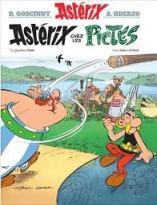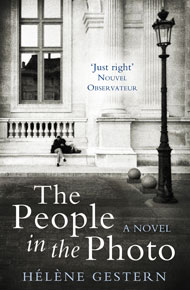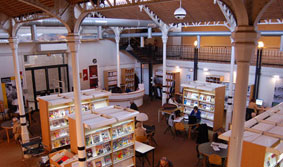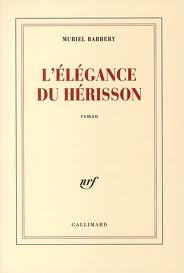Yesterday via a link on twitter, I read a provocative article in BBC News Magazine by Hugh Schofield entitled Why don’t French books sell abroad? It was an interesting, if superficial article, that made a few observations without going into any depth to understand the contemporary literary scene in France. It asked questions, reminded us of some old provocative stereotypes and did little to enlighten us on the subject of what excites French readers and why the English-speaking world aren’t more aware of their contemporary literary gems.
Kate from BooksKateRates, reads and blog about French literature and wrote an interesting blog post in response to the article and I have been scribbling notes since reading the original article. I plan to share them here, as it is a fascinating subject if one takes the time to research and understand it.
But firstly, I wanted to show you the library, as it offers a glimpse into how the French absorb literature and culture and it’s one our favourite local hangouts.
Situated in what was a 14,500 sqm match factory, the library, La Bibliothèque Mèjanes, is part of the Cité du livre, a centre for the arts and culture which includes an auditorium for lectures and readings, rooms for more formal lectures, a small cinema showing themed films for 3 week periods (currently Humphrey Bogart films), a music and film lending room, adult and children’s libraries, a press room, an exhibition space (currently celebrating the centenary of Albert Camus), a café and plenty of space for research and study.
As we walk in through the enormous sculptures of the covers of Camus’s L’etranger on one side and Saint-Exupéry’s Le Petit Prince and Molière on the other, we arrive in a long corridor and the reception area for borrowing and returning books.
Turn left and we head towards the reading library where outside the door is a display of books for adolescents. A quick glance at these books shows us that half of them are translated fiction, from South African, German and Hispanic authors.
 Inside, we walk past displays of translated literature originating from South Africa, a tribute to Nelson Mandela, then the stacks of Bande Dessinée, the very popular hardcover graphic novels, which even today remain at the top of the French bestsellers list, right now its Asterix chez les Pictes, visiting the people of ancient Scotland!
Inside, we walk past displays of translated literature originating from South Africa, a tribute to Nelson Mandela, then the stacks of Bande Dessinée, the very popular hardcover graphic novels, which even today remain at the top of the French bestsellers list, right now its Asterix chez les Pictes, visiting the people of ancient Scotland!
And here are the novels, in French called romans. Rows and rows of books and you might notice something they all have in common, well, in fact, something they all lack. Colour.
Compare it to the shelf opposite which contains the English language novels. It certainly removes that whole likelihood of an impulse buy based on an intriguing cover.
Most French literary novels are published without fancy colourful covers and while in the bookshop you might find first editions with promotional covers, there are many more with pale or cream covers without images and a black or red text title.
However, after looking around a little more, I discover that there is colour in some sections. Science Fiction and Fantasy are full of dark colours and the books covers in the section entitled Policiers (Crime) are mostly black. However, novels and poetry, even the section called American Literature pale into insignificance among a sea of white. It reminds me of one of the three principles of France l’égalitié and certainly here, all books have the same chance of being found, whether it’s from the library or in the bookshop, not just due to their bland covers, but also due to a government policy called le plan livre and the fixed price of books.
It costs €17.50 to join the library (adult) and its free for children, there is no cost for lending and no fees for late returns. 16 items (books and CD’s) and 3 DVD’s can be borrowed at any one time for a period of 3 weeks and the first renewal can be done online. The library is also full of computers providing free internet access to all members. My only complain is that its closed on Sunday and Monday. C’est la vie en France!
So what kind of books do French people read today? And is it true that nearly half of the fiction read is translated foreign fiction? And why don’t we see more books by French authors in English bookshops? These questions and more I will talk about in the next post Reading Contemporary French literature.
 In the meantime, if you want to know what’s popular in France and available now to read in English, check out Gallic Books, who offer the best of what’s available in French translated in English with new titles coming out every month.
In the meantime, if you want to know what’s popular in France and available now to read in English, check out Gallic Books, who offer the best of what’s available in French translated in English with new titles coming out every month.
I’m looking forward to reading The People in the Photo by Hélène Gestern due out in English in February 2014. If you wish to read it in French, it’s already available with the title Eux sur la photo.









This was a fascinating article and I’m really looking forward to your next bit on it! I always held a standard, supportive view of French attitudes towards literature and the book market, admiring their lack of concern for what the book looks like and more for his content but……the BBC’s article has thrown up some questions as to whether these are the best moves to make in a modern world, including Le Prix Fixe.
That said, not everything is negative. I’m very excited about Gallic books, having just read ‘Monsieur Le Commandant’, which is getting great attention and I have ‘The People in the Photo’ just waiting to be read.
LikeLike
It’s interesting the fixed price, it means that big budget bestsellers don’t dominate the market and each book is valued on merit. So much in French life works on bouche à oreille or what we call word of mouth and perhaps French books rely on this much more, which then leads to invitations on to cultural programs or features in literary magazines.
Generally, to be a bestseller in France doesn’t guarantee much of an income as the volume of books sold individually is rarely large. Although there is a fixed price, there are still versions of books that are excellent value, like €2 each for a new book and many more short stories and short novellas, many more smaller, shorter books, something for everyone it seems.
Can’t wait to hear how you find The People n the Photo, it sounds interesting.
LikeLike
Claire, this sounds like a wonderful place. Thank you for the tour!
LikeLike
Thank you Valorie, happy to show you around and your visitors at Books Can Save A Life. This evening when I was working out in the Luberon with a client, we were listening to Classic FM and The Twelve Days of Christmas song came on the radio, I was thinking of you and your wonderful post, thank you again! 🙂
LikeLike
Pingback: Twelve blogs for Christmas « Books Can Save A Life
Love the look at books there… very interesting.
LikeLike
Bookshops and Readers coming soon…
LikeLike
I’m not sure who(I think npr but can’t say for sure)did a similar article about translations in the u.s.and why we don’t read more translations. I’d love to read more translated work if it was easier to find. I also love what the French do with their covers. I’d love to not be swayed by an enticing picture and bug a book for content alone. Thanks for posting!
LikeLike
Thanks for this wonderful post, Claire. I was quite excited when I read it, because I have been thinking about this for a while. I want to write a long comment about it, but I have to go out now and so I will comment when I get back. I wanted to just say that we needed a post like this now to celebrate French literature. During my journey into French literature this past year, I have discovered some amazing writers and books which have ended up being my favourites. I also love the way French writers have experimented with the form of the novel and with storytelling techniques and how they have mostly been the first to do that. Well, I will write more when I get back 🙂 Thanks a lot for the inspiration.
LikeLike
Hi Claire, It took me a while to gather my thoughts on this topic. I loved what you said about why French books have mostly similar covers. It is wonderful to know that the library is one of your local hangouts. I enjoyed reading Kate’s post and your comment there. I also read Schofield’s article and Laurence Marie’s reply to that. I found Schofield’s article not really well researched or objective. Most of his generalizations and inferences were weak and internally inconsistent (in one part of the article he said something and in another part of the article, what he said or quoted contradicted his earlier statement). I also found that half his arguments were not about why French books are not widely translated into English / why translations of French books into English don’t sell well, but most of his arguments were about why French literature, in general, is not good or popular, even among French readers. Most of the time I didn’t know whether he was trying to answer the question that he started with or whether her was trying to critique contemporary French literature. I thought I will write a detailed comment on Schofield’s article but as it became too long, I decided to publish it as a separate post. You can find it here. Looking forward to hearing your thoughts on it.
Thanks for writing about this topic and for all the links. I enjoyed reading all the posts and articles and thinking about them and articulating my own response to them.
Looking forward to reading the second part of your post on this topic, on reading contemporary French literature.
LikeLike
Hi Vishy, I am glad you decided to write a post on it, you have so many great points to make and such great books to recommend. You are right that the article really doesn’t present much of an argument, the question really is about why the British don’t read more French literature and rather than looking to the British publishing industry for an answer, he looks to blame the literature itself. It would be interesting to actually know why; I don’t actually believe readers are significantly different in what they want from literature.
I am no expert, but I do wonder if it has more to do with the publishing model and a market economy which has ruthlessly diminished the viability of small presses and independents and favours the populist bestsellers. Markets respond to what consumers demand, but when the market doesn’t actually offer the choice consumers want, they stop purchasing or find alternatives. It is clear that the publishing industry is in a state of redefining itself and I think that literary niches will survive, especially when those who promote them maintain close contact with their audiences/readers.
I think covers are an issue for English language readers who have no knowledge of an author, just because that is what we have become used to seeing and we have developed an attachment to how we perceive covers, I have even noticed how UK readers react when they go to bookshops in the US and are sensitive to the differences in covers there, each country has a kind of design preference and it is very interesting to study the differences.
We all like to refer to anecdotal evidence, though it doesn’t actually provide evidence of anything. Schofield spoke with one independent bookshop owner in Paris, but neglected to tell us that there are in fact 792 independent book shops in Paris, and there are more than 3,000 in France. That fact alone speaks volumes, and represents a stark contrast in government policy between France and the UK, one that stoically supports its literary and cultural traditions, while the other is attempting to make them stand alone and support themselves.
The debate continues….
LikeLike
It was interesting to read your thoughts, Claire. I remember once thinking about pre-second world war literature of different countries and I remember feeling that while British and American literature of that era was plot oriented , French, German and Russian literature, though they also had plots, tended to have long monologues and philosophical digressions. I also remember thinking American literature was more plot oriented than the British – I remember that the American prose style of that era was very plain and the focus was on communicating a thought or an idea rather than creating a beautiful sentence which may not be understood by the reader. However with the cross pollination of ideas in the last many decades, I feel that it is difficult to categorize a novel that way today – there are American novels which are long monologues while there are French and German novels which are plot oriented. I was thinking about this when I read your comment that these days readers aren’t significantly different in terms of what they want from literature. I agree with you on that.
It is interesting to know about the reactions of UK readers to US covers. I didn’t know about that. The one thing that I have a problem with though is when the title of a book is changed when a US edition of a book is published in the UK and vice versa. I don’t know why the publishers can’t stick to the original title. Because most of the time I feel that the original title is better, while the new title looks very contrived. (For example, the title of Hans Fallada’s ‘Everyman Dies Alone’ was changed to ‘Alone in Berlin in the UK edition. I don’t know why, because I feel that the original title is definitely better. Another example is Matthew Crawford’s ‘Shop Class as Soulcraft : An inquiry into the value of work’. The UK edition of this book had the title ‘The Case For Working with Your Hands : or Why Office Work is Bad for Us and Fixing Things Feels Good’. In my opinion the first title is beautiful, while the second title, though explanatory, is very contrived.
It is interesting that Schofield spoke to one indie bookshop owner and generalized his conversation. To make the sample more consistent, he should have atleast talked to a French owner of an indie bookshop.
LikeLike
La Bibliothèque Mèjanes looks wonderful. Such striking sculptures and so bright and airy inside. I remember those somewhat uninspiring book jackets (to British eyes, anyway) from my bookselling days nearly 15 years ago and am amazed that they’re still the same. Hope you’re enjoying Brodeck’s Report. He’s one of my favourite authors, French or otherwise!
LikeLike
Actually, when I take you inside the bookshop, you’ll see a lot more colour and images on the covers, it makes me wonder if the libraries buy the cheaper versions, as there are many versions of the same books and the more attractive covers are most likely limited edition, much like hardbacks in the English language world. They don’t seem to do hardbacks for novels and actually I struggle to describe them in French, I’m not even sure if there is an equivalent word for it!
LikeLike
That’s very surprising, although I’ve always felt we in the UK publish too much in hardback. Looking forward to the bookshop photos.
LikeLike
Oh, boo! I missed this library when I was in France! Thank you for sharing such a well-written and interesting blog. I enjoyed it and look forward to enjoying more French literature.
~Carole Avila
LikeLike
Make sure you come back and visit! And keep reading French literature 🙂
LikeLike
I read this article yesterday and was wondering what you thought about it! Enjoyed your take…it is very interesting about the plain covers…in India book covers are very colourful indeed!…
LikeLike
It makes us realise how much we appreciate the covers, I notice as well reading on a kindle that I miss picking up a familiar book cover, the e-book covers you only see once and then it is only text. And when thinking about what to read next, the cover is an alluring temptation.
LikeLike
Hi, very interesting post. Thank you. I really enjoyed The Elegance of the Hedgehog which I read in French when it first came out. I hope the translation does it justice! I would like to feature a paragraph from this post on my Weekly Bloggers’ Round-up. I hope that is OK.
LikeLike
Hi Rosemary, Thanks for commenting and no problem at all, please share whatever you like. There will be more coming on this topic 🙂
LikeLike
Thank you Claire. I look forward to reading the next post. Here is the link: http://www.aussieinfrance.com/2013/12/weekly-blogger-round-up-getting-tough-in-french-top-7-moments-in-france-a-french-library-and-literature/.
LikeLike
Pingback: Weekly Blogger Round-Up – Getting Tough in French – Top 7 moments in France – A French library and literature | Aussie in France
I want to go to your library! It only seems to be the more academic bookshops in Bordeaux that are intimidating and monotone, Mollat, the biggest bookshop in Bordeaux, is wonderful, a real browsers paradise. I look on Gallic books now almost as my default wishlist, The People in the Photo sounds most intriguing, I can recommend The Confidante by Hélène Grémillon too. I’m really looking forward to getting hold of a copy to The President’s Hat too and I tried out on of Musso’s books just because I saw three people in the same carriage on the train reading it and wondered why he is so popular. I’m still wondering.
LikeLike
Gallic Books really is a find I agree and I hope The President’s Hat and others increase in popularity now that there is a publisher focused not just on the bestsellers, but those excellent books that get passed around by word of mouth here.
I am going to write up a sort of interview I did with one of my mature French students who is an avid reader and she mentions the Marc Levy, Guillaume Musso phenomena, you are right to ponder!
LikeLike
I wish we had your library in Paris! It looks beautiful! I too read that article about French books. In any case, whether French books are big sellers abroad or not, the culture of reading is alive and well right here (thank goodness). When we see all of the excitement around the “rentree litteraire,” “prix Goncourt” and “Salon du Livre,” it’s clear that writing and reading remain important here in France. Would be nice if the great books we discover here could make that international leap…
LikeLike
I am sure there must be some wonderful libraries in Paris, but yes we are very fortunate to have this resource here, I absolutely love our library, it is like a sanctuary. I would love to go to the Salon du Livre, in fact I have been listening to a podcast about it and would like to write a post about that too, I must make a plan to try and attend the next one! And increase the number of books in French I read in the meantime. Do you read in French?
LikeLike
I do read in French, so make a point of reading any books by French authors in the original language. However I do read more books by American or English authors and feel more comfortable reading in English… Happy Holidays!
LikeLike
Great post….perhaps an idea to take some foto’s of my local Dutch library. Always fun to see where I try to find some French books. Unfortunately, the selection is terrible, not one Zola! Classic French books are important to read, but I am enjoying contemporary authors too. Keep us up-to-date with new French books….you are in the right place ( France) to do that!
LikeLike
A tour of a library in another country is a wonderful thing to do, we certainly can not assume they are all the same, I love how even libraries have different ideas about who they think they are – here they are certainly not just confined to just books, they are like a grand intellect themselves, inviting in all manner of artists, authors and creative types, maintaining their links with the past and yet reaching out to embrace change and the future at the same time.
LikeLike
Excellent, informative post, Claire! I’d read that article too but had no facts to prove otherwise. This also leads to the issue of packaging and marketing. I wonder how good a book would sell (in N. America) if there’s no cover art but just minimalist like the book you’ve shown here. BTW, that’s a wonderful book, The Elegance of the Hedgehog which I read in English (with an interesting cover.)
LikeLike
It seems the facts are not easy to come by, but that certainly did not stop the writer from sharing his thoughts. All conversation and debate is welcome I guess, especially if it gets more people to consider reading more French literature!
I think even in America some titles do have minimalist cover artwork, but only when the author is very well known, for example JoJo Moyes cover for Me Before You in the US was just big words on a one colour red background, whereas they used more of a cute pink and beige image in the UK, I guess the image costs a lot more to create and so when an author is more popular and well known, there is less need to attract readers that way. It is also the case with Maya Angelou’s US titles for example Mom & Me & Mom was text only, but in the UK the cover used photographs.
There’s an interesting article here Design: Don’t judge a book by its cover, particularly in France I read in the Guardian, which suggests it might just be pride, as each country has a choice, they seem to want to exercise it.
LikeLike
Fascinating insight and always good to see an Asterix book around. Have you ever come across Les Tuniques Bleues? Zola is always something of a swller and nemirovsky…at least on my book case. Probably others as well, I will have to check when I get back home.
LikeLike
I admit, I’m not really a reader of BD’s (Bande Dessinée) although I often look at them in the library as there are SOOO many and they are so popular. My daughter is really into reading Manga, which I find even more fascinating – since, even though they are translated from Japanese into French, they still read from right to left. I pick those up and get completely confused, I mean , back to front, and in French, that’s just too much for this old fashioned brain to handle! She writes her own books as well, well should I say she draws them 🙂 and is now writing music to accompany the story – maybe that’s the future, I just observe and admire the creativity. 🙂
LikeLike
Pingback: On French Literature, Books, Translations – A fan’s ode to French books and writers | Vishy's Blog